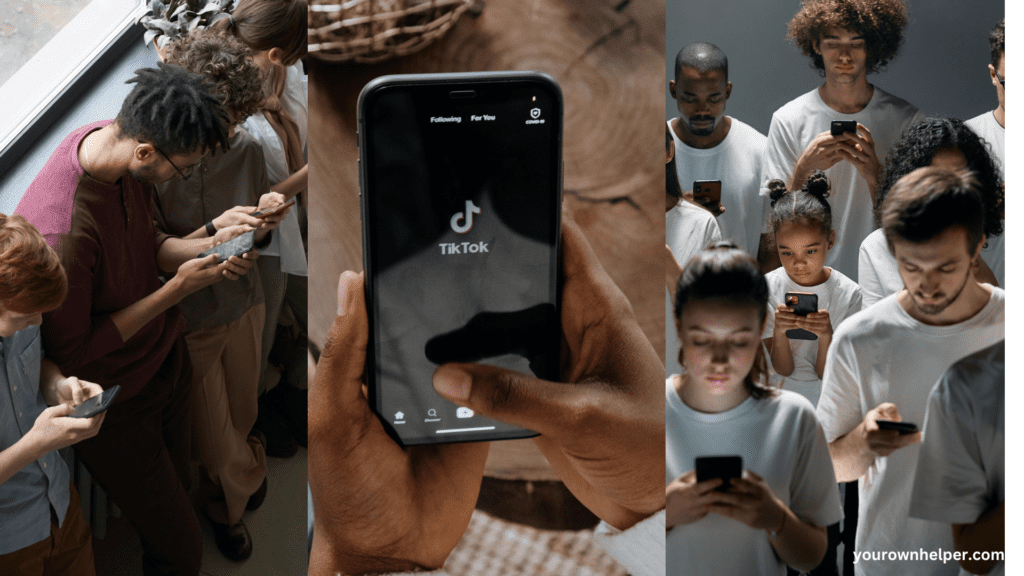
Introduction:Tik tok addiction
You open the TikTok app once again, telling yourself you’ll just watch a few videos to relax. Before you know it, hours have passed in an endless scroll of dances, comedy sketches, animal clips, and more. TikTok can be highly addictive, Its algorithm is designed to keep you watching by serving up an endless stream of personalized, entertaining content. But spending too much time on the app can negatively impact mental health and make it hard to focus on other aspects of life. Recognizing the signs of TikTok addiction is the first step. Then, with self-control, planning, and other techniques, you can break the habit of excessive TikTok use. This article will explore what TikTok addiction looks like, its effects, and actionable tips to stop the compulsive scrolling for good.
Understanding TikTok Addiction and Its Effects:
Understanding what is TikTok Addiction?
TikTok addiction refers to excessive dependence on the social media platform, causing negative effects on mental health and relationships. Symptoms include overuse, content overload, anxiety, and social disengagement. To avoid negative effects, individuals should be aware of these symptoms and take action to control their consumption of TikTok. By understanding and managing their addiction, individuals can improve their overall well-being.
Its Effects:
Effects on Mental Health
Excessive TikTok use can have negative impacts on both your physical and mental health. Some of the potential effects include:
- Sleep problems from staying up late watching TikTok
- Neck pain and headaches from looking down at your phone for long periods Increased anxiety, depression, and loneliness from comparing yourself to others
- FOMO (fear of missing out) from seeing curated glimpses into the lives of friends and influencers
- Distraction and reduced focus from constant stimulation and switching between short videos
Loss of Interest in Other Activities
You may be addicted to TikTok if you have lost interest in socializing with friends in person, engaging in hobbies and activities you used to enjoy, or being productive at work or school. Tik Tok addiction can rewire your brain’s reward center to derive pleasure primarily from social media use.
Anxiety When Separated
Do you feel extremely anxious or irritable when you can’t access TikTok or your phone?These withdrawal symptoms are a sign that you have become dependent on the dopamine rush that comes from scrolling and liking content.
Continued Use Despite Consequences
If your TikTok use is causing problems in your relationships, work or education but you continue the behavior anyway, it indicates you have lost control over your social media consumption. You may make excuses to justify your extended screen time or become defensive when others express concern over your TikTok addiction
Signs of TikTok Addiction:
If you find yourself compulsively checking TikTok, spending increasing amounts of time on the app, or becoming irritable when unable to access it, you may have developed an addiction. Some common symptoms of TikTok addiction Include:
- Checking TikTok first thing in the morning and right before bed
- Losing track of time while scrolling through TikTok videos
- Choosing to browse TikTok over socializing with friends or family
- Feeling unable to stop watching TikTok videos
- Becoming restless or irritable when unable to access TikTok.
How Much Time Do People Really Spend on TikTok?

TikTok has gained immense popularity over the past years, especially among younger generations. As the app has become more widespread, concerns have emerged regarding how much time individuals spend using the platform and the potential negative impacts of excessive use.
Average Daily Time Spent
According to several surveys, the average TikTok user spends around 52 minutes per day on the app. The highest usage tends to be among younger users, with teens reporting over an hour of daily use. While 52 minutes may not seem alarming, the concerning statistic is that many users report difficulty limiting themselves to just one hour. This difficulty controlling usage is one of the hallmarks of potential technology addiction.
Some Shocking Statistics
Some surveys have found that a subset of TikTok users spend 2-3 hours per day on the app, scrolling endlessly through short videos. Around 10% of teens report spending over 3 hours per day on Tik Tok.
How to Stop Your Binge Scrolling on TikTok:
Set a Time Limit
Limit the time you spend on the TikTok app each day. Start by reducing your usage by T half and continue decreasing in increments of 15-30 minutes per week. Use an alarm or timer to stay accountable to the limits you set.
Find Alternate Activities
Replace the time you would spend scrolling TikTok with other enjoyable activities like exercising, socializing in person, pursuing hobbies, reading, etc. Keeping your hands and mind occupied will help overcome cravings for the app.
Ask for Support
Tell friends and family about your goal to reduce TikTok usage and ask them to check-in on your progress. Consider seeing a therapist or joining an online support group. Having a strong support system will help motivate you to stay committed to overcoming your addiction.
Breaking a TikTok addiction requires dedication and consistency. Stay focused on limiting usage over time and replacing the habit with healthier alternatives. You can beat this addiction and enjoy more balance and productivity in your daily life.
Delete the App
Removing the temptation altogether is the most effective way to curb addiction. Delete the Tik Tok app from your phone and any other devices. Out of sight, out of mind
Recovering From TikTok Addiction and Improving Your Mental Health:
Filling your time with healthier activities
Replace the time previously spent scrolling TikTok with exercise, social interaction, mindfulness practices or pursuing a hobby. Exercise is particularly helpful for combating addiction and improving mood. Call a friend, get outside for a walk, cook a healthy meal, pick up a book or start a journal. The more you engage in life offline, the less desire you’ll have to binge on social media.
Making lifestyle changes
Changing behaviors and mindsets that fuel the addiction is essential for long-term change. Practice self-care, limit stress, and nurture gratitude and contentment: Spend less time passively consuming information online and more time actively engaging with the real world around you. With time and conscious effort, you can overcome your Tik Tok addiction by developing balance and moderation. The rewards of improved wellbeing. relationships and life satisfaction will make the effort worthwhile.
Distract Your Mind with Productive Activities
TikTok addiction can be controlled by partaking in worthwhile pursuits that support long-term objectives. Rather than wasting hours scrolling through TikTok, put your attention toward developing new abilities or seizing chances that will help your career. This can involve starting your own business, developing a skill, or learning about a subject you are interested in. You may end the cycle of addiction by concentrating on these pursuits, which will also help you grow personally and professionally, regain control over your time, and create a better future.
How Long Does It Take to Overcome TikTok Addiction?

Depending on variables including the intensity of the addiction and the individual’s dedication to recovery, recovering from a TikTok addiction can take a variety of times. While some people experience progress in a matter of weeks or months, others could need more time. In order to adopt better habits and use technology in moderation, patience and perseverance are essential.
Conclusion:
In conclusion, overcoming TikTok addiction requires patience, dedication, and a willingness to change. The journey to recovery may vary in duration for each individual, but with perseverance and support, it is possible to regain control over one’s screen time and lead a more fulfilling life. By recognizing the signs of addiction, implementing strategies to reduce usage, and focusing on productive activities, individuals can break free from the cycle of excessive TikTok scrolling and embrace healthier habits. Remember, recovery is a process, and every step forward is a step towards a brighter future.
